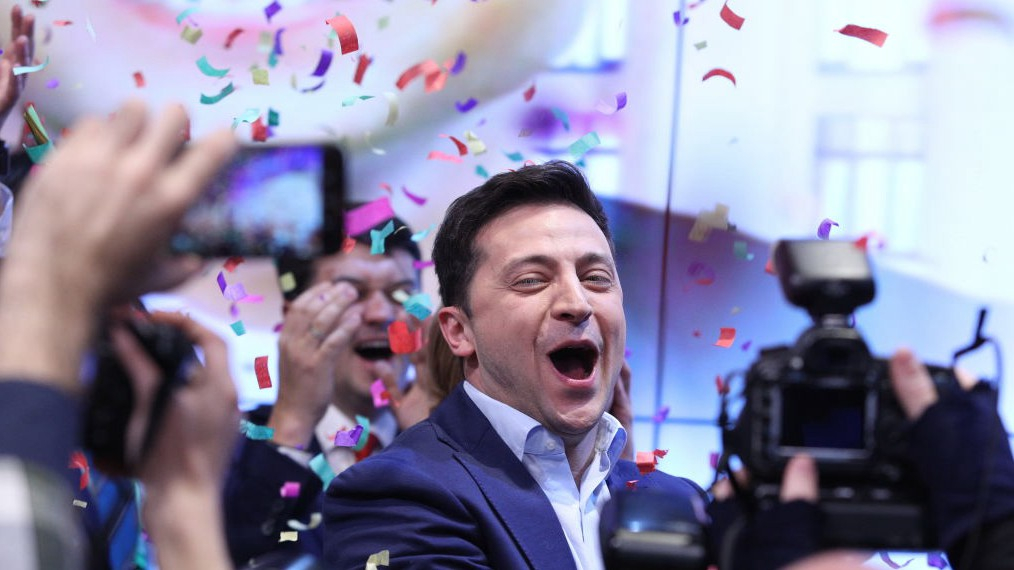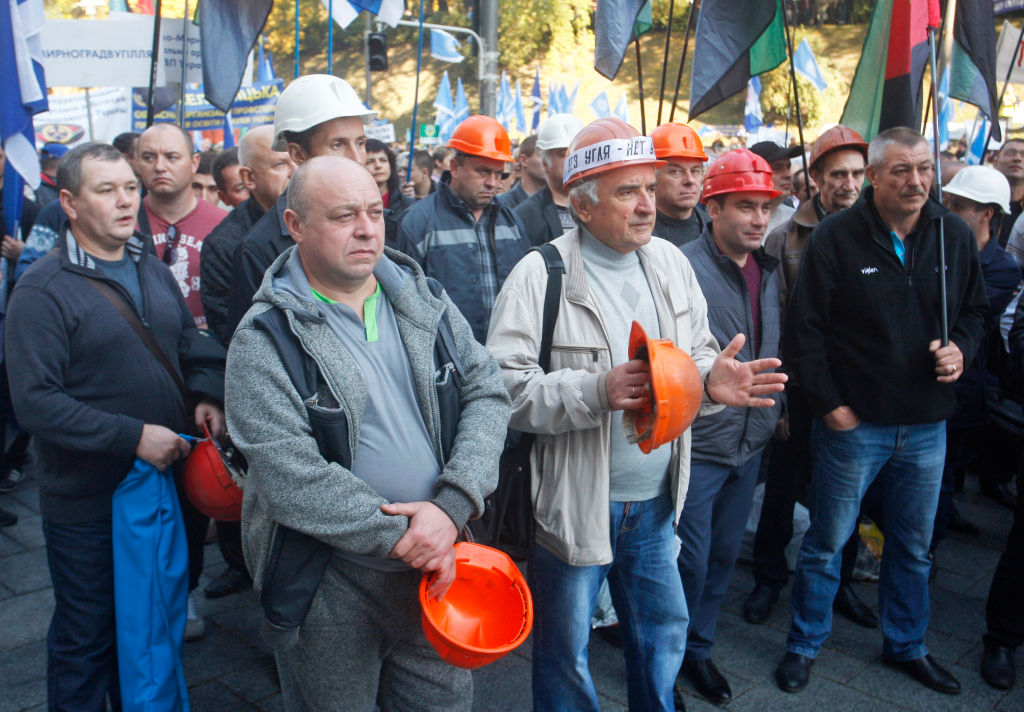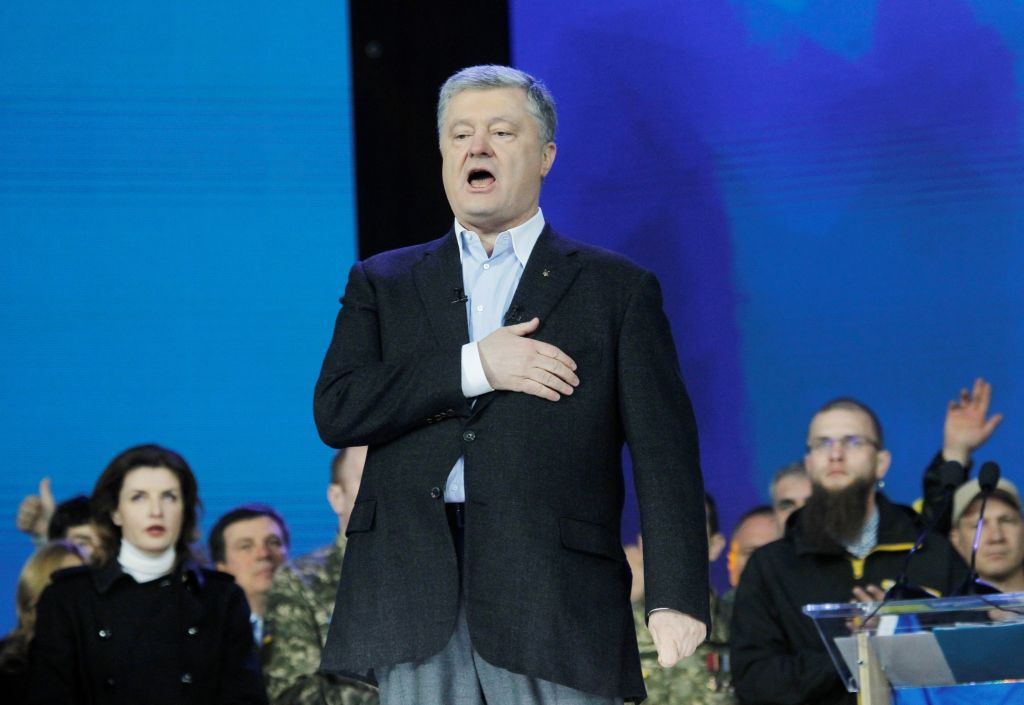
Opinion
18:20, 22-Apr-2019
All the world's a stage, but politics is no comedy for Ukraine
Cui Zheng

Editor's note: Cui Zheng is an associate professor at the Center for the Economies and Politics of Transitional Countries at Liaoning University in China. The article reflects the author's opinions, and not necessarily the views of CGTN.
In the second round of the just-concluded Ukrainian presidential election, former comedian actor Volodymyr Zelensky won the majority of votes, defeating the incumbent President Petro Poroshenko to secure victory. The final results will be announced on May 1, and the inauguration ceremony of the newly elected president will be held no later than June 3.
The two rounds of battles over Ukraine's presidency have become the best window to observe Ukraine's political situation and social dynamics in the five years since the outbreak of the Ukrainian crisis. The results will certainly bring more uncertainty to the country's already fragmented political landscape. It will also have an important and far-reaching impact on the complex and sensitive geopolitical relations in Europe.
Hope on uncertainty
After the disintegration of the Soviet Union, the 2019 election is the quietest of all the presidential elections in Ukraine. There was neither mutual accusation of election fraud nor street protests. Soon after the preliminary results were released, Poroshenko acknowledged defeat in a tweet, pointed out that the voting result was fair and just, and congratulated Zelensky on his election as the new president. It can be said that this marks the progress of Ukrainian society and democracy. However, for Ukraine and other stakeholders, the cost of such progress is too high.

Miners hold flags during a protest, in front of the Ukrainian Cabinet of Ministers building in Kiev, October 17, 2018. /VCG Photo
Miners hold flags during a protest, in front of the Ukrainian Cabinet of Ministers building in Kiev, October 17, 2018. /VCG Photo
TV star Zelensky, who joined the political arena and announced his candidacy for president only in January this year, is a complete "political rookie." He has neither experience in politics nor a clear and substantive policy agenda. He seldom makes public speeches or directly interacts with voters. Zelensky's high popularity shows how disappointed the Ukrainian people today are with the current situation.
When Poroshenko came to power in 2014, the whole country had high hopes. However, what has happened in Ukraine in the past five years is pure disappointment: 25 percent of Ukrainians live below the poverty line, far higher than the 15 percent level before the "Maidan Revolution" in 2014; inflation has remained high and the real income of residents has fallen by about 22 percent; The expected political democratization and economic modernization has failed to materialize, and bureaucracy and corruption are rampant; cutting ties with Russia and joining the EU have progressed slowly while conflict in eastern Ukraine continues.
In fact, many Ukrainians who voted for Zelensky clearly know that electing a TV star to lead the country may not be the best choice, but they are even more reluctant to let Poroshenko remain in power. They have pinned their hopes on uncertainty.
Politics is no TV show
Most of Zelensky's campaign team came from the production team of "Servant of the People," and he himself was the creative director and the first producer of the sitcom. Zelensky, which won the election through his TV image as a president who severely punishes corrupt officials, may soon find that there is an insurmountable gap between governing the country and role-playing, There might be little wiggle room for him in handling internal affairs. It will be a huge challenge for him to fulfill campaign promises and avoid repeating the mistakes of his predecessor.

Ukrainian president and presidential candidate Petro Poroshenko (C) attends a debate with contender Volodymyr Zelensky (not seen) at the Olimpiyskiy Stadium in Kiev, Ukraine on April 19, 2019. /VCG Photo
Ukrainian president and presidential candidate Petro Poroshenko (C) attends a debate with contender Volodymyr Zelensky (not seen) at the Olimpiyskiy Stadium in Kiev, Ukraine on April 19, 2019. /VCG Photo
Zelensky's "Public Servant Party" was founded less than a year ago and barely has any influence in parliament. The struggle between Ukraine's president and parliament, and between the president and prime minister over the distribution of power has always been the crux of Ukraine's political fragmentation.
In future, the establishment forces in the Ukrainian parliament may use every opportunity to seek more power from the young anti-establishment president, which could become one of his major challenges in the future. However, Yulia Tymoshenko's move before the second round of the presidential election to call on voters to support Zelensky inevitably leads to speculation that the two have reached a consensus on some kind of political alliance. The realignment of political forces will inevitably lead to a purge for the faction led by Poroshenko. Ukraine will face even greater turbulence if foreign forces weigh in.
Under the background that the pro-Western political forces have an absolute advantage in Ukraine and anti-Russian sentiment has become politically correct, Ukraine's westward journey of joining the EU will continue, but it will not be smooth sailing.
The one-time "outsider" of politics is now directly in charge. Comedian-turned-president Zelensky has reached the peak of politics. I am afraid no one can say for sure what is in store for him and the Ukrainian people. I hope for the best.
(If you want to contribute and have specific expertise, please contact us at opinions@cgtn.com)

SITEMAP
Copyright © 2018 CGTN. Beijing ICP prepared NO.16065310-3
Copyright © 2018 CGTN. Beijing ICP prepared NO.16065310-3